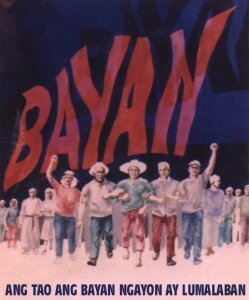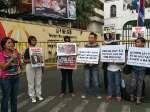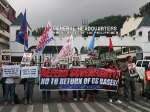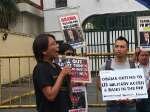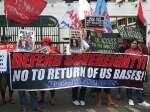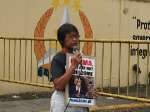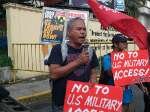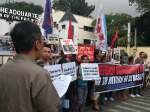BAGONG ALYANSANG MAKABAYAN (BAYAN) or New Patriotic Alliance was established in May 1985 at the height of the struggle against the US-Marcos dictatorship. It brought together more than one thousand mass organizations with a total membership of more than one million, representing different classes and sectors of society and committed to the people’s struggle for national liberation and democracy.
Bayan is a multisectoral formation struggling for national and social liberation against imperialism, feudalism and bureaucrat capitalism. It envisions a just society, free from foreign domination.
Founded on the determination and strength of the majority of oppressed classes, Bayan is an alliance composed mainly of organizations of workers and peasants. Various sectors from the youth, women, indigenous peoples, government employees and professionals also account for many of our organizational members. Bayan counts as its members individual personages who serve in its leading bodies.
As an alliance of organizations, BAYAN promotes the unity of its participating organizations through the principle of consensus in decision-making, after a free and full discussions of issues and with due respect to the independence and initiative of each participating organization. BAYAN also promotes the principles of mutual support, cooperation and protection between and among its participating organizations.
BAYAN propagates and fights for the nationalist and democratic demands of the people through legal and militant forms of struggle. It conducts forums, seminars, lobbying, pickets, strikes, marches, demonstrations and people’s strikes. It participates in elections in various ways and gets involved in legal actions. Though it does not engage in armed struggle, BAYAN respects the right of others to take such an option for the just redress of grievances.
Over the past 25 years, Bayan figured prominently in the ouster of the Marcos dictatorship and the Estrada regime. It has fought various repressive policies and campaigns, including the wave of extrajudicial killings and enforced disappearances under the Arroyo regime. The organization was at the forefront of the movement to oust the corrupt, fascist and puppet Arroyo government. Bayan continues to fight for justice for the human rights victims of the Marcos and Arroyo regimes.
Bayan was also involved in the ouster of the US military bases in the Philippines in 1991 and in the ongoing struggle against the RP-US Visiting Forces Agreement.
BAYAN is a multi-sectoral campaign center for its member organizations nationwide. Its range of activities include fora, seminars, lobbying, pickets, marches, demonstrations and people’s strikes;
BAYAN works with other patriotic and progressive organizations and individuals based on the principles of consensus, independence and initiative;
BAYAN supports progressive candidates and parties in elections; Conducts education campaigns on the country’s basic problems and how to solve them in ways that are democratic and people-oriented;
BAYAN initiates and/or promotes socio-economic relief and rehabilitation projects in support and in defense of the democratic rights of internal refugees and other victims of militarization and natural and man-made calamities, especially among the peasants and national minorities in the countryside.
BAYAN is a founding member organization of the International League of Peoples Struggle (ILPS) and works with other anti-imperialist and democratic forces worldwide.
BAYAN has regional, provincial and local chapters throughout the Philippines as well as overseas chapters in the United States and Canada. It has also established Information Desks in Hong Kong and Japan. It is currently developing its formation in Europe.
BAGONG ALYANSANG MAKABAYAN
PROGRAM OF ACTION
April 1994
I. BRIEF HISTORY OF THE FILIPINO PEOPLE’S STRUGGLE
The Filipino people have long been enslaved and humiliated by foreign powers and by the local
exploiting classes of big comprador capitalists and landlords. But our history as a people has not only been one of oppression and exploitation. It has also been a history of struggle against foreign domination and for a liberating social order with independence, freedom, justice, equality and prosperity.
For more than three hundred fifty years, the Filipino people sustained their struggle against Spanish colonialism. There were numerous uprisings against the conquistadores, some lasting for more than fifty years, in various parts of the archipelago. The Moro and Cordillera peoples waged fierce resistance and preserved their cultural identities, In I896, the Philippine revolution led by the Katipunan broke out and succeeded in less than two years to overthrow Spanish colonial rule. The Philippines was the first colonial nation in Asia to proclaim its independence and establish a republic.
But the United States, then a rising imperialist power, intervened and launched a brutal war of aggression against the new republic. Our people fought bravely against the cruel and better armed veterans of the genocidal war against the native American-lndians, The aggressors killed nearly a million Filipinos out of a population of seven miIIion, and reconcentrated thousands of villages in the first case of strategic hamletting by the US in Asia. The ilustrado leadership
of the new republic capitulated, and the Philippines became a formal colony of the United States in 1902.
The struggle for national independence against US colonialism took on an added dimension with the emergence of organizations and political parties committed to promote and protect the rights of the toiling masses or workers and peasants. The struggle for national freedom was interwoven with the struggle for democracy and social justice. Under US colonial rule, peasant uprisings and workers’ strikes became widespread. The colonial government actively used the
Filipino big comprador and landlord classes till suppresses the people’s yearning for independence and democracy.
The Japanese occupation of the country during World War II pushed the people into spontaneous armed resistance. Guerrilla groups proliferated throughout the country. In Central and Southern Luzon, the Hukbong Bavan Laban sa Hapon (Hukbalahap) led by the merged Communist Party of the Philippines (CPP) and the Socialist Party of the Philippines (SPP) was the biggest guerrilla force. It established local resistance governments and carried out land reform. But these gains were abandoned upon the return or American troops and the restoration of US colonial rule.
The grant of bogus independence was preceded by the signing into law by US President Truman of the Philippine Rehabilitation Act and the Philippine Trade Act. These legitimized the colonial pattern of production, trade and finance, and perpetuated the rule of the local big comprador and landlord classes after July 1946. The Parity Amendment was forcibly passed in the Philippine Congress. This was followed by the signing of other unequal treaties that allowed US military bases on Philippine soil and maintained US military control over the Armed Forces of the Philippines (AFP). The Philippines was formally into a neocolony of the US.
The facade of independence and democratic elections did not dampen the people’s aspirations for national freedom and democracy. The Huk rebellion was defeated due to the errors of its leadership and not to the “desire of the people for peace.” The nationalist upsurge in the late fifties brought renewed vigor to the struggle as a new generation of workers, peasants, students and professionals became involved in the movement. They led and took part in the pro-people and anti-imperialist mass actions in the following years.
The late sixties saw the emergence of the national democratic movement on a clear programmatic Iine and perspective. It gained strength in the first quarter storm of 1970, took deep roots among the people in the seventies despite the imposition of martial law, and developed into a national force in the following decade, The US-Marcos dictatorship tried to stem the growth or the movement through open fascist rule. But the peasants’ demand for land gained momentum after the fake land reform proclamation by Marcos. Workers’ strikes broke out in 1976. This was followed by the democratic reform movement among students, teachers and professionals. The religious took to the streets to defend civil liberties and human rights. The Moro people launched armed resistance in 1972, the Cordillera people in 1976.
The assassination of Benigno Aquino in 1983 saw the explosion of huge demonstrations against the dictatorship. At the core of these mass actions was the national democratic movement leading such broad alliances as the Justice for Aquino; Justice for All (JAJA), the Nationalist Alliance for Justice, Freedom and Denl0cracy (NAJFD), and the Coalition of Organizations for the Realization of Democracy (CORD).
BAGONG ALYANSANG MAKABAYAN (BAYAN) was established in May 1985. It brought together more than one thousand mass organizations with a total membership of more than one million, representing different classes and sectors of society and committed to the people’s struggle for national liberation and democracy. The founding chairperson was Senator Lorenzo Tañada. With the dissolution of JAJA and CORD, BAYAN became the coordinating center for open mass mobilizations against the dictatorship. It led big demonstrations in Metro Manila and carried out nationally coordinated strikes and welgang bayan (people’s strikes) in major cities of the country. These mass actions greatly contributed to the downfall of the Marcos regime.
In the snap polls of 1986, BAYAN tried to negotiate with the representatives of Mrs. Aquino to take a firm stand on the dismantling of the US bases. It decided to boycott the elections. But it put up a center to monitor the conduct of the polls and held nightly vigil at the Batasang Pambansa. After the elections, BAYAN was among the first organizations to call for massive civil disobedience. It joined the spontaneous gathering of people at EDSA and massed its forces before municipal buildings andll1ilitary camps in many parts of the country when the military mutiny began. On the night of the departure of the dictator, BAYAN was the main contingent in the mass of people gathered around Malacañang Palace.
Under the US-Aquino regime, BAYAN steadfastly stood up for its principles. It lobbied for nationalist and democratic reforms in the constitutional commission and raised the people’s agenda during the ceasefire talks between the regime and the National Democratic Front. It exposed and opposed the anti-national and anti-democratic policies of the regime. Together with its participating organizations, BAYAN led seminars, pickets, strikes, marches and demonstrations on the following major issues: land reform, better wages and working conditions, US military bases, foreign debt, IMF-WB impositions, oil price increases, urban renewal, women’s rights, human rights violations, the regime’s total war policy, peace and ecology. After each coup attempt against Mrs. Aquino. BAYAN called on her to stand with the people but to no avail.
BA YAN and its participating organizations became the targets of repression by the regime. KMU workers were killed and maimed in violent dispersals of picket Iines. KMP peasants were victims of massacres in Mendiola, Lupao and other places. KADENA, a youth organization was brutally suppressed in Metro Manila. Several national and regional leaders of BAYAN were assassinated with impunity to sow fear and paralyze the organization. These included Lean Alejandro, its founding secretary-general, Rolando Olalia, its founding vice-chairman, Dave Bueno, Ramon Cura, Noel Mendoza, Oscar Tunog and Vic Mirabueno, all regional leaders from Northern Luzon, Central Luzon. Metro Manila, Visayas and Mindanao, respectively. BAYAN survived the Aquino regime intact.
II. PHILIPPINE SOCIETY AND BAYAN’S COMMITMENT
Philippine society remains semicolonial and semifeudal. It continues to be ruled by such local exploiting classes, as the big comprador bourgeoisie and the landlord class supported by US and Japanese monopoly capitalists. Its economy is based principally on the production or export crops and the extraction of raw materials for processing by foreign industries. There are no basic industries. All manufacturing is dependent on imported components, machinery, spare parts and fuel for production. The unequal exchange between cheap raw materials and reprocessed products, on the one hand, and expensive producer and consumer goods, on the Other, creates the conditions for the chronic crisis that afflicts the economy.
The introduction of packaging and export industries and the export of labor power have not solved the perennial balance of Ira de and payment deficits, nor the problem of accumulating surplus labor brought about by the lack of basic industries and the exhaustion of the land frontier. The resort to massive foreign borrowings has only compounded the situation with the money being spent on infrastructures and nonproductive ventures, non-viable mills and technology from foreign monopoly companies; and portions going to the pockets of bureaucrats. The economy has been in a state of recession for the last three years.
The economy is being managed by US imperialism through the extended fund facility and structural program of the International Monetary Fund and the World Bank (IMF-WB). These have served to strengthen the semicolonial and semi feudal system through such devices as the deregulation of foreign exchange transactions, liberalization of investments and imports privatization and rationalization. The foreign debt stands at USD40B as of April 1993 (NEDA). Forty percent of the national budget is allocated for foreign debt servicing. This has prompted more local borrowings, the frequent printing of new money, and the persistence of hyperinflation. Yearly, new taxes are imposed and expenditures for social and public services are slashed. The socio-economic crisis just keeps worsening.
The Filipino people bear the brunt of the crisis. As of July 1993, 75 percent of the population or 7.8 million of the 10.5 million families live below the poverty level of P244/day that an average family of six needs in order to survive. The effective unemployment rate is about 44.2% of the total labor force of27.5 million (NEDA). While inflation keeps eroding the real income of wage-earners, the average minimum wage nationwide is pegged at P100l day as of December 1993. The gap between the rich and the poor is widening and is the worst in Southeast Asia.
There is widespread poverty, hunger and disease. In Metro Manila alone, there are 3.4 million squatters and 80,000 streetchildren. In Bicol, the average monthly household income is P1665, the starvation Ievel (IBON). Nationwide, there are 2.5 million malnourished children, on which daily 1277 die of pneumonia, 217 of diarrhea, and 240 of measles. Infant mortality rate is 52.9/1000 livebirths, one of the highest in the world, with 28 babies dying of tetanus daily (Health Workers Manual). There is rampant neglect and abuse of women. More than 50% of pregnant and lactating mothers suffer from anemia. Prostitution and criminality abound.
Corruption plagues all branches and levels of government. The social fabric is being tom asunder.
The anti-national and anti-democratic character of the US-Ramos regime is spelled out in its Medium Term Philippine Development Program (MTPDP) or “Philippines 2000.” The Ramos government dreams of turning the country into one big export processing zone for foreign monopoly capitalists. It has assiduously been carrying out the dictates of the JMF-WB. Ramos has not only been blind to the dismal failures of his predecessors with export development strategies and foreign investment schemes, he has also refused to recognize the existence of land problem. He has militarizing the bureaucracy and is maneuvering to keep himself in power as Marcos did. The chief implementor of Marcos’ martial law and originator of Aquino’s total war policy has drawn the wrong lessons from the past.
Hand in hand with the total war policy, Ramos has initiated a psywar scheme on the issue of “reconciliation and peace” in an attempt to neutralize and isolate the national democratic movement. He has even coopted the sustainable development rhetoric of non-government organizations in order to present a progressive façade. But human rights violations persist. More than a million people continue to be displaced by military operations. The rights of the Moro and Cordillera peoples to self-determination and autonomy have still to be won. While the relief and rehabilitation of victims of natural disasters are neglected, environmental destruction goes unabated in the export processing zones and from the mining, logging and fishing operations of foreign companies, big compradors and bureaucrat capitalists, including military officers.
The US-Ramos regime has rehashed policies of deception and terror of its predecessors. For as long as the monopoly capitalists and their local adjuncts, the big comprador bourgeoisie and the landlord class control and dominate the social, economic, political, and cultural life of the nation, the basic problems of the Filipino people remain. But the people will not endure their suffering and misery forever. There is widespread and deepgoing social unrest. The US-Ramos regime cannot stop the Filipino people from organizing to bring about the fundamental
restructuring of Philippine society.
We, the participating organizations of BAYAN, reaffirm our commitment to be among those in the forefront of our people’s continuing struggle for national liberation and democracy. We reiterate our determination to help lead and mobilize the people to bring their struggle to greater heights and final victory.
We renew the vision of our forefathers to build a Philippine society that is free and independent, and where the basic rights of the people, especially the working men and women, are protected and promoted, so that justice and equality shall prevail, and the people shall enjoy the fruits of their labor and the prosperity of the nation.
We hereby pledge this commitment in honor of the thousands of martyrs who have died for the cause of national freedom and democracy, and for the sake of the future generations of Filipinos who will harvest the fruits of the struggle.
III. BAYAN’S PROGRAM OF ACTION
BAYAN is an alliance of organizations committed to the Filipino people’s struggle for national liberation and democracy. It is guided by the nationalist and democratic aspirations of the people in the pursuit of its objectives.
BAYAN and its participating organizations are bound by the Declaration of Principles, the Constitution, the By-Laws.and the Program of Action, as well as policies and decisions which shall be adopted by its duly constituted bodies.
As an alliance of organizations, BAYAN promotes the unity of its participating organizations through the principle of consensus in decision-making, after a free and full discussions of issues and with due respect to the independence and initiative of each participating organization. BAYAN also promotes the principles of mutual support, cooperation and protection between and among its participating organizations.
BAYAN propagates and fights for the nationalist and democratic demands of the people through legal and militant forms of struggle. It conducts forums, seminars, lobbying, pickets, strikes, marches, demonstrations and welgang bayan. It participates in elections in various ways and gets involved in legal actions. Though it does not engage in armed struggle, BAYAN respects the right of others to take such an option for the just redress of grievances.
BAYAN can only be as strong as its participating organizations. So it encourages them to strengthen themselves by arousing and organizing the people within their respective classes and sectors and in their respective communities and areas or work. BAYAN intends to cooperate with other patriotic and progressive alliances, organizations and individuals based on the principles of consensus and of independence and initiative to advance the struggle for national liberation and democracy.
BAYAN hereby adopts the following eight-point program based on its Declaration of Unity.
1. Assert national sovereignty and realize national independence from foreign domination. The basic right of the Filipino people to national sovereignty and independence has long been suppressed. For centuries, we have been controlled and dominated; first, by colonialism, and then by imperialism, The Philippines remains a nominal republic under the hegemony of US imperialism and the world capitalist system.
Without national freedom, the basic precondition for the exercise of our collective and individual rights is absent. We do not decide our own destiny as a nation. This has been determined for us by our colonial and imperialists masters. Our social, economic and political development has been dependent on the needs and requirements of foreigners. This has kept us from providing for our basic needs as a people. Under such conditions, our people have never had the opportunity to exercise fully their individual freedoms.
This foreign domination has been facilitated by various laws, treaties and agreements that violate the national sovereignty, independence and territorial integrity of the Philippines, and allow other countries to interfere in our internal affairs. These were imposed on the nation with the connivance of the local ruling classes who have benefited from the arrangements.
BAYAN has always stood for Philippine national sovereignty and independence. It was in the forefront of the victorious struggle against the US bases in the country. It sustained a nationwide information campaign against the continued presence of the bases, and held daily demonstrations before the Senate for the non-renewal of the treaty.
BAYAN opposes the presence of foreign troops, facilities and bases in Philippine territory. It is against the entry, transit and deployment and/or stockpiling of nuclear weapons in the country. It opposed to foreign military aggression or intervention in our internal affairs and the use of Philippine territory for the aggressive expansionist policies of other countries.
BAYAN calls for the immediate termination of all unequal agreements entered into by the Philippine government, such as the US Military Assistance Agreement, the US-RP Mutual Defense Agreement, the Quirino-Foster Agreement and the RP-Japan Treaty of Amity, Commerce and Navigation.
BAYAN believes that the best guarantee for national independence is an independent national economy. It upholds the right of the nation to control its natural resources and define its own economic policies and program, free from foreign and local exploiters in order to respond to the basic needs and welfare of the people. Only by carrying out a policy of national industrialization, based on the implementation of a genuine land reform program, can the Philippines hope to establish and self-reliant economy.
BAYAN opposes the continuing control of the economy by foreign monopoly capitalists through the IMF-WB. It rejects the conditionalities imposed by the IMF-WB for the extension of foreign loans. It calls for the non-payment of onerous loans and the reduction of the debt service payment. It works for the repeal of the subservient foreign investment laws that only strengthen the neocolonial character of the economy.
2. Empower the people, especially the workers and peasants, promote civil and political rights and develop people’s democracy.
BAYAN believes in the empowerment of the people especially the working people to assert, exercise, protect and promote their basic rights. It believes that empowerment of the people means their liberation from foreign and domestic oppressors and exploiters and involves being able to be aware and critical of their conditions, acquire knowledge, skills and material means to define, articulate, decide and act on their interests.
BAYAN believes that empowerment begins through people’s organizations that harness the collective strength of the workers and peasants and draw upon this strength to protect and uphold their interests, and to mobilize them into action to realize these interests.
BAYAN believes that empowerment of the people is fully realized through the establishment of a social order based on:
a. strength and will of the working people under the leadership of the working class:
b. an electoral system that guarantees the genuine representation of the workers and peasants in all decision-making bodies of government from the local to the national level;
c. structures which guarantee that the rights of the people are upheld and the bourgeois and feudal oppressors and exploiters can no longer oppress and exploit the people.
BAYAN works for the people’s enjoyment of the following civil and political rights:
. the right to freedom of speech. self-organization and assembly; freedom of religious belief and practice; and to universal suffrage;
•the right to equality before the law, without prejudice against women, the poor, the uneducated, the children and the aged, the sick or the disabled; regardless of race, religion or political belief;
•the right to own the means of production for the common good; the right to full employment and job security: and the right of workers to form unions and participate in the running of enterprises;
•the right to a clean, safe and ecologically sound environment;
•the right of women to participate equally in all fields of endeavor;
-the right of children to social and cultural well-being; and
•the right of the people to rise and fight against those seeking to violate and subvert these rights.
BAYAN opposes the total war policy of US-Ramos regime. It also opposes the continuing displacement of communities from the regime’s total war policy. It calls on the government to abide by its commitment to international laws and covenants on the respect- for the civil and political rights of the people.
3. Promote a self-reliant and sustainable soeio-economic development through national
industrialization, genuine land reform and protection of the environment.
BAYAN believes in the collective advancement of the people’s economic interests and welfare: in the development of both industry and agriculture under the principles of self-reliance, and the optimum productivity, with industrialization as the leading factor and agriculture as the base of the economy; the social ownership of enterprises providing vital and basic goods and services and lines of industry essential to the national economy; the cooperativization of agriculture after genuine and thoroughgoing land reform; the use of planning to muster and direct economic activity towards balanced development and the satisfaction of social needs; the promotion of mechanisms for harnessing collective efforts of the people to increase productivity of the national economy; support for the local and private sector contributing positively to the nation’s productive capacity and capital resources: and. The development of science and technology directed towards improving the capacity of the nation to provide
for the basic needs of the people.
BAYAN supports and continuously works for the full implementation of a genuine and truly liberating land reform program. in the belief that the progressive solution of the centuries-old agrarian problem is an essential premise for any full scale national development.
BAYAN calls for the setting up of basic industries especially those whose raw material requirements are most abundant in the country. It also demands the nationalization of vital and strategic industries owned and controlled by foreign monopoly capitalists. and the big comprador and bureaucrat capitalists. BA Y A N believes in the promotion and protection of Filipino capital to the extent that this will contribute to the progress and advancement of the nation.
Foreign investments shall only be allowed and• encouraged to the extent and under conditions that arc beneficial to our national economic growth. Foreign loans shall be contracted only to finance productive undertakings in line with the national economic policy, and under terms of payment that is affordable and not inimical to the goal of developing a self-reliant economy. Trade with other countries should be promoted on the basis of equality and mutual benefit,
BAYAN believes in the decisive role and the integrity of labor and productive forces: in providing work opportunities for all, work that is dignified, fulfilling and productive; the just recognition and compensation for work, and protection from abuse and exploitation of labor; the rights of workers to participate in determining conditions of work; and, in developing cooperation among those who till the land and make it productive.
BAYAN believes in the equitable distribution or national economic wealth. There should be primary concern for the needs and interests of all the working people, especially those marginalized in previous circumstances. Social services should be made available and distributed to all. The development of the public ownership of the means of production as well as the promotion of various other means of property ownership should not constitute or result in private monopoly control.
BAYAN believes in national economic development that makes responsible and optimal use of natural resources and one that protects the ecology and the environment from abuse and destruction. BAYAN opposes the continuing exploitation of our land and marine resources by foreign monopoly capitalists, as well as the transfer of pollutant industries and the dumping if nuclear and toxic wastes in the country. Our people have already suffered so much from the consequences of these imperialist depredations.
4. Improve the people’s working conditions and standard of living and attain full employment.
The Filipino people, especially the toiling masses of workers and peasants, arc the hardest hit by the continuing crisis of [he semicolonial and semifeudal system. With widespread unemployment, the great majority of the people live in absolute poverty. Those lucky enough to be employed are not allowed to enjoy the fruits of their labor as the Philippine government continues to be at the side of the employers who do all they can to keep wages as low as possible. While wage-earners are victimized by the repressive tax system, they are denied access to efficient and adequate delivery of basic services, such as health, housing and education. Instead, the Philippine government chooses to .spend tilt’ large chunk of the annual budget to debt servicing and to the military.
BAYAN believes in providing for the social and economic welfare of the toiling masses of workers and peasants. It works for the formulation of policies that will create full employment of the labor force, ensure job security and humane working conditions, and guarantee decent wages and compensation.
BAYAN believes in the responsibility of the state to ensure efficient and adequate delivery of appropriate health and medical care for the working people, as well as setting up a system that will provide special care and support for’ those in need: pregnant and nursing mothers, young children, the handicapped and disabled, and the aged. It calls for a national drug policy that focuses on the nationalization of all foreign-owned or –controlled drug companies and the banning of hazardous technologies and products.
BAYAN supports the demand of urban poor dwellers for low-cost housing and urban renewal projects. It opposes the arbitrary and inhuman demolition of urban poor dwellings. Any on-site development or relocation project should not result in dislocation of families and communities and the displacement of jobs and work opportunities, and should provide for adequate health and social services.
BAYAN believes in free, relevant, scientific, patriotic and quality education. Education should not only impart skills and knowledge, but promote critical thinking, appreciation of national culture and identity and pro-people and non-sexist values and concern. Special education must be ensured for the disabled and handicapped. There must also be a program for developing gifted children and youth to enhance their talents for national development.
5. Raise the people’s cultural standards and promote a national culture that is progressive, patriotic, scientific and popular.
BAYAN has always stood on the side of positions and trends in Philippine society that are positive forces in building a national culture that is progressive and scientific, genuinely popular and Filipinistic in the best sense of the term. It believes that such a culture should be elaborated by Filipinos to replace the decadent foreign and feudal culture that has been imposed on us by old and new colonizers.
BAYAN believes that a people’s culture should be progressive i.e. for national liberation and social emancipation. The Filipino people’s struggle for national liberation and democracy embodies the highest goals and aspirations of our people at this point in time. So it is only fitting that this should be depicted in the literature and the arts of our time. It is of great import to free the Filipino people from backward thinking and to inculcate in them a pro-people culture that would impel them to struggle for the overthrow of their oppressors.
BAYAN aims to instill among the people a sense of nationhood and purpose and imbue them with the spirit of fighting for their rights and against oppression and exploitation. For years, the people’s organizations allied in BAYAN have succeeded in popularizing progressive ideas, exposing the roots of the people’s sufferings and offering them the vision of an independent, democratic and just society.
BAYAN calls for the promotion of literature, visual arts, theater, music and dances that reflect the problems and aspirations of the masses of workers and peasants who are also their main audience. The utilization of these various art forms is complemented by massive literacy programs to liberate the people from ignorance? superstitions and to counter the rotten ideas propagated by the imperialists and their local cohorts.
BAYAN fights for a patriotic, scientific and mass culture. Patriotic because it upholds and defends the sovereignty and independence of the country, combats colonial mentality and subservience. It is a culture that raises high the distinct Filipino character and the richness of the cultures of the indigenous peoples found in the various regions and areas of the country.
BAYAN believes in the promotion of a scientific culture that opposes feudal and superstitious way of thinking which make the people resistant to the ideas of radical change. Consistent with this is the promotion of science and technology in the schools’ curricula.
This culture must be popular in the sense of being by and for the people and that is reflective of their conditions and aspirations and rejects the prevailing decadent, bourgeois and feudal, anti-people and anti-won1en culture. The inculcation among the people of the power of their collective action and unity should be propagated. History books that contain distortions made by the imperialists and the ruling classes should be rewritten in a way that highlights the people’s revolutionary tradition and struggle against oppression and exploitation.
BAYAN believes that the education system and the mass media should be used to promote this new people’s culture. It is therefore imperative that ownership of these be freed from foreign control and private monopoly. The full flowering of Filipino as the national language must be encouraged, while other local languages and dialects will continue to be used and developed.
6. Respect the right of ethnic minorities to self-determination and autonomy.
The country’s indigenous peoples and the Bangsa Moro people have for years lived in utter despair and destitution because of government’s neglect and exploitation. Their right to their ancestral lands continues to be violated by the indiscriminate intrusion of local and foreign corporations that want to exploit the rich natural resources in the areas they inhabit. Their call for autonomy and self-determination has been ignored by the Philippine government.
The history of the country’s indigenous peoples and the Bangsa Moro people in resisting aggression and colonialism is fraught with heroism. The country’s indigenous and the Mora peoples valiantly fought against both the Spanish and US colonizations. To this day, they continue to stand against government policies geared towards the further exploitation of the remaining stands of forests for “development” projects and oppression of their peoples.
BAYAN upholds the right of the indigenous people, and the Moro people, to self-determination and the running of their own affairs, to free themselves from national oppression and exploitation, chauvinism and discrimination. This is consistent with the building of new Philippines where there is unity und equality of all peoples and nationalities and where every citizen is free from imperialism.
While allowing them to determine their political, economic and cultural development, indigenous people, and the Bangsa Moro people should also be accorded rightful representation and participation in the central government.
The granting of genuine autonomy, to which past and present governments have paid lip-service, shall be finally accorded the indigenous peoples. Autonomy means full guarantees for self-governance within the framework of a truly people’s democratic republic.
7. Eliminate discrimination against women.
BAYAN opposes in principle and in practice all forms of discrimination against women. It stands for and continuously works to realize the complete equality of the sexes in all spheres.
BAYAN believes that Filipino women suffer under triple oppression: as part of a nation under semicolonial and semifeudal rule; as part of the oppressed classes; and as women living in n patriarchal society.
Women belonging to the exploited and oppressed classes and sectors share a litany of sufferings und hardships. Women workers suffer discrimination in that they are the last to be hired and the first to be fired.
Aside from this. they suffer sexual harassment at the workplace. They do not enjoy additional benefits such as day-care services, and at times denied maternity benefits.
The condition of peasant women is worse. The work they contribute in tilling the land is in the main unpaid. Often they are also made to render unpaid house work for the parasitic landlord. They are also victims of usurers and land grabbers. The poor people in the countryside, being the principal target of the government’s total war policy, have also suffered immense hardship and destruction to life and properties. Many have been displaced and become internal refugees. To this day, though, landlessness is still the most serious problem experienced by the peasant class.
Women professionals are not spared from severe economic crisis. They continue to face the specter of unemployment, low wages and repression. It is indeed revolting that thousands upon thousands of women are forced to go abroad to become domestic helpers and suffer further exploitation or, worse, to become prostitutes.
BAYAN fights for the right of women to be protected from all forms of social discrimination and degradation. It emphasizes that the struggle for national liberation is intertwined with the struggle to liberate the women and vice versa.
As women they have the right to divorce, over their bodies and reproductive functions. Single women parents deserve state support. Other women issues that should be attended to putting up structures and mechanism to break the bonds of their social confinement and isolation; support programs for abused and abandoned women, maternal health care, safe means of contraception and skills development.
8. Promote an independent, peaceful and just policy of international relations.
BAYAN calls for the abrogation of all unequal treaties and agreements and rejects the government’s entering into relations that allow the subservience of our national interests and violate our integrity as a nation, and denounces all forms of foreign intervention and interference in the country’s internal affairs from all other states.
BAYAN envisions a foreign policy that is independent, peace-oriented, and non-aligned. This should be a policy that renounces war as an instrument of national policy; condemns expansionist policies of other countries and recognizes the sovereignty, territorial integrity and independence of all nations: and supports the movement of non-aligned nations, international anti-nuclear and anti-bases movements and the ASEAN declaration of Zone of Peace, Freedom and Neutrality.
The Philippines should establish diplomatic and mutually beneficial economic relations with all
countries irrespective of ideology or social system.
BAYAN has always stood for the protection of the rights of migrant Filipinos and for them to be accorded equal treatment with the workers in the receiving countries. It views the problems of out migration as integral to the problems of the Filipino people at home .and to the global problem of imperialism. It is exerting great effort to organize migrant Filipinos to fight for their right and welfare in the receiving countries and to be. accorded proper recognition at home.
BAYAN supports the progressive aspirations and liberation struggles of other peoples. In this context, it supports the efforts of people’s organizations to take active part in all moves towards establishing a just international economic order. It consistently support, the positive, pro-people decisions of the United Nations (UN), but it also opposes efforts of imperialist powers to use the UN to oppress certain nations or ethnic communities.
BAYAN supports all efforts that uphold the sovereignty, independence and equality of nations, and promote world peace and progress. #
